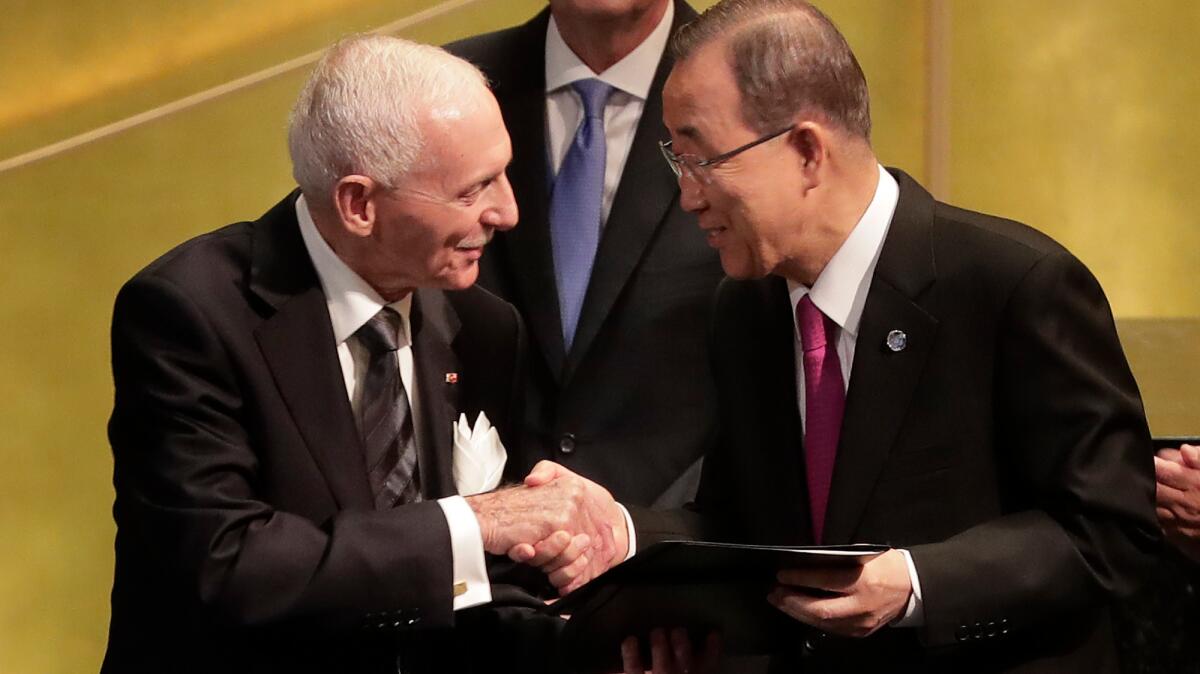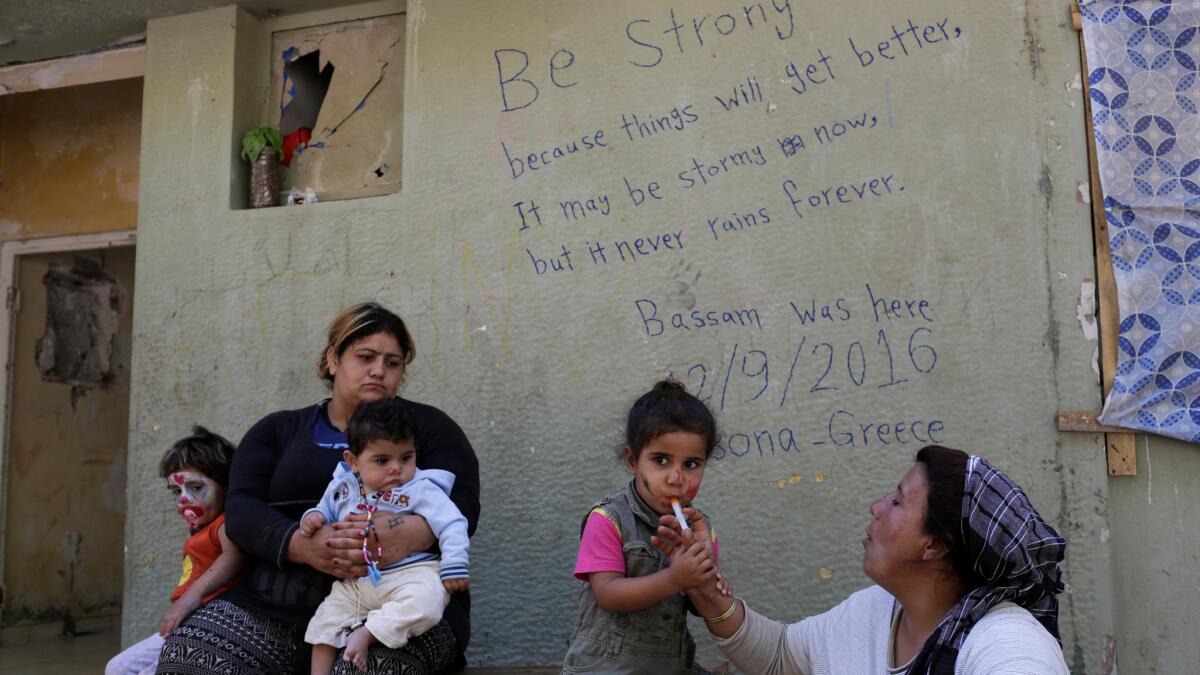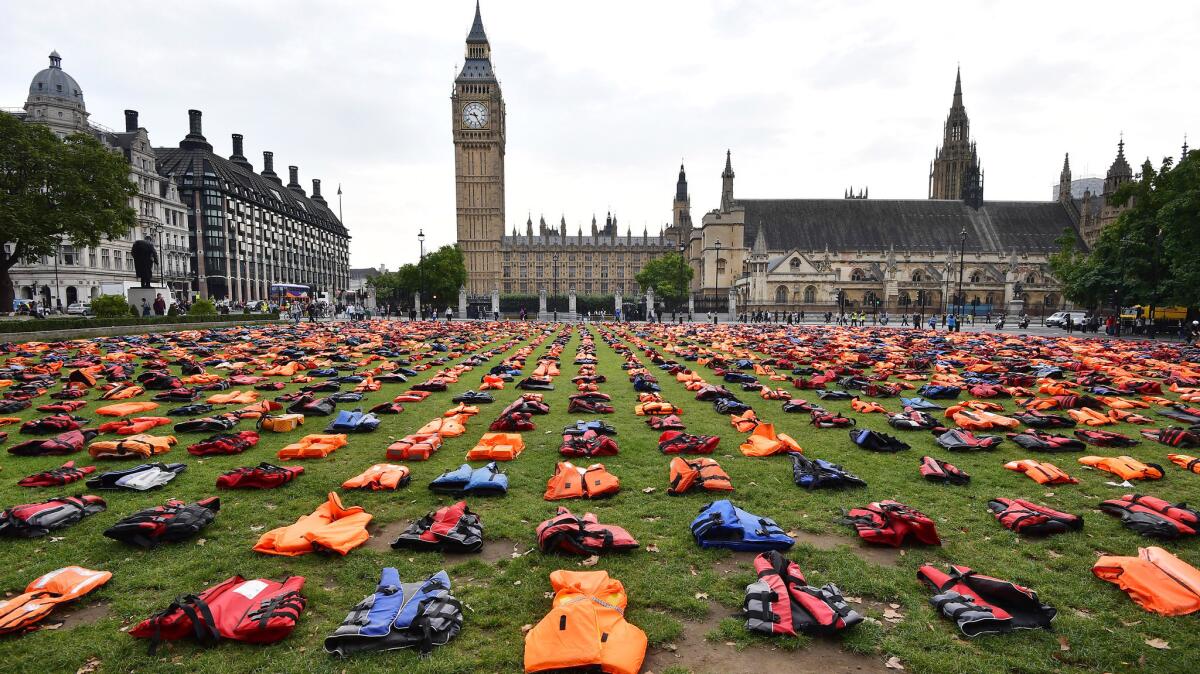Global leaders pledge more help for refugees; critics say pledges are not enough
- Share via
Global leaders promised Monday to better protect the rights of refugees and migrants, and undertake a more coordinated response to the world’s deepening crisis of displaced people. But human rights and humanitarian groups criticized the agreement for being weak and failing to address the magnitude of the problem.
How to deal with the world’s more than 65 million displaced people was the focus of the U.N. General Assembly’s high-level summit on the largest movement of refugees and migrants in 70 years.

U.N. Secretary-General Ban Ki-moon called the meeting “a breakthrough in our collective efforts to address the challenges of human mobility.” He said adoption of what is being called the New York Declaration for Refugees and Migrants would mean “more children can attend school; more workers can securely seek jobs abroad, instead of being at the mercy of criminal smugglers, and more people will have real choices about whether to move once we end conflict, sustain peace and increase opportunities at home.”
The agreement is expected to lead to the development of standardized guidelines on the treatment of migrants in vulnerable situations, herald more equitable sharing of hosting refugees, and spearhead adoption of a global compact in 2018 that promises “safe, orderly and regular migration.”
But many human rights and humanitarian groups slammed the resolution for failing to mandate concrete action that obligates countries to do their fair share.
“It definitely does not go far enough,” said Margaret Huang, interim executive director for Amnesty International. “Amnesty welcomes the secretary general’s impetus to have this summit, but unfortunately, governments around the world have failed to step up to this call for the responsibility of sharing the resettlement and support of refugees.”
Wealthier nations have been criticized for not committing to take substantially larger numbers of refugees, such as 10% of the refugee population annually that was suggested in an earlier draft of the agreement, which member states are accused of watering down.

“We’ve seen governments undermining any attempt to insert more concrete language into the declaration that would achieve more affirmatively what governments need to do now,” said Josephine Liebl, who heads Oxfam’s global displacement campaign. “We have a lot of qualifiers.”
For example, the agreement acknowledges the need “to address gaps in humanitarian funding,” but says only that providing additional resources would be considered “as appropriate.” The document also encourages the resettlement of refugees and migrants, and promises action to combat “xenophobia, racism and discrimination” against them, but — again — says that measures will be taken to improve the integration and inclusion of these people “as appropriate.”
“They adopted the declaration, which in large part contains nice words, but the question really is what will be different from tomorrow onward,” Liebl said.
Huang, the Amnesty official, expressed alarm over statements from countries such as the United Kingdom, Australia and Hungary that she said emphasize border security and national security and push for refugees to remain in the countries where they initially land.
FROM THE ARCHIVES -- Fleeing Syria: A desperate migration »
U.K. Prime Minister Theresa May told the Guardian newspaper Monday that it was better to help more refugees in their own region than resettle a smaller number elsewhere.
“We have always taken the view that we can help more Syrian refugees by putting aid into the region,” the paper quoted May as saying.
As such, the majority of refugees remain stranded in poorer countries that have less capacity to support them. Together, Ethiopia, Kenya, Jordan, Lebanon, Pakistan and Turkey host a third of the world’s refugees, while accounting for 1.6% of the world’s economy, according to Amnesty. And only around 100,000 refugees are actually resettled annually, the human rights group said. (The Obama administration recently announced its intent to resettle 110,000 refugees in 2017, up from 85,000 this year.)
In recent days, protests have been held in some nations to highlight the plight of displaced people. In Slovenia, dozens of refugees demonstrated Monday at an asylum center to object the slow pace of processing asylum requests. And demonstrators took to the streets of London to show their support for refugees and to urge the U.K. government do more to tackle the migrant crisis.

“While we are encouraged global leaders came together recognizing the need to address historic levels of displacement, the New York Declaration does little to change the status quo,” Nazanin Ash, vice president for public policy and advocacy at the International Rescue Committee, said in an emailed comment.
His group is among those calling for more robust and long-term support for host states, for alternative forms of admission to other states, and for a commitment to resettle 10% of refugees worldwide over the next three years, among other issues.
“Responsibility sharing for refugees exists more in rhetoric than in practice,” Ash said.
ALSO:
As resources run dry, Syrian refugees cling to survival in Jordan’s urban hubs
Op-Ed: Rethinking the way the world deals with refugees
More to Read
Sign up for Essential California
The most important California stories and recommendations in your inbox every morning.
You may occasionally receive promotional content from the Los Angeles Times.











